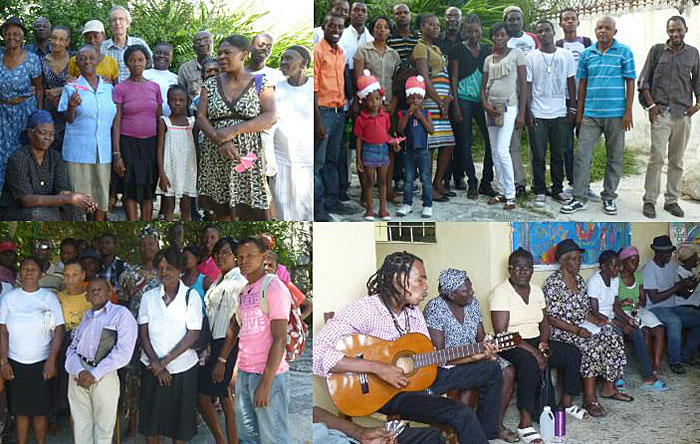The World is Not Made to Fight Poverty

This article is imported from our 2017 Stop Poverty Campaign web site.
In Port-au-Prince, Haiti, adults who are members of the Committee to Rally the Fourth World, youth from the reading group, members of the council of friends, parents and those who work with preschoolers and the ““Welcome Babies” project, and volunteers of ATD Fourth World, all put their daily routines aside for an afternoon to come together to celebrate the 100th birthday of Father Joseph Wresinski, founder of ATD Fourth World. Forty-five people participated to discuss how to make Father Joseph’s message more widely known to others, and to inspire family, friends, and communities. After welcoming participants, followed by a time of recollection, and then presentations, the participants discovered the Stop Poverty call to action and together watched the film, Encounter with Joseph Wresinski, by journalist Claudine Faure.
Each participant then discussed what the filmed interview with Father Joseph meant to them and from that what they would like to share more broadly within their respective communities. The following are some comments from those group discussions:
- Extreme poverty forces people to accept what they do not like.
- Each person is a person, regardless whether he or she is in poverty or not; I am there just like any other person. If within society there are people trapped in extreme poverty, it is because society has allowed this to happen… by not having done anything to fight it.
- Two things are necessary to fight extreme poverty: work and unity; we have to join together. Violence must be stopped because extreme poverty can never be eradicated wherever violence exists.
- Increase awareness; it is the most important step. Society needs to change the way it see people living in poverty. The poorest are able to think and to feel just like anyone else in society.
- People followed Father Joseph because they sought a better life; they hoped that one day the door that had been closed could be open for them.
- Today I am here, and if I dare to express myself, it is thanks to Father Joseph. It is thanks to him that I know who I am, even if I am poor. Thanks to Father Joseph’s movement, even if I do not know how to read, I am able to sit with everyone. He showed how we should live with each other. Even if we are poor, we have our place in society.
- In the film, we see that he walked in the mud; as a priest, at that time, he could have had prejudices himself – but he didn’t. We see the unity between him and the children; they walked behind him and when it rained they used their hands to create an umbrella to protect him. He put aside all the privileges that could have benefited him. He lowered himself completely to be with the poorest, to share his thoughts, to have them feel his presence, and to know that he valued them.
- He came from the world of extreme poverty. He knew he could fight for those who society had excluded; he knew how his mother had fought; that he wanted to help his people while living with them.
- Father Joseph speaks of the importance of education in the fight against extreme poverty. We need to ensure that governments fulfill their responsibilities. Governments need to create the conditions for children to be able to go to school. Without education, we cannot escape extreme poverty. When children are together to listen to a story, they are happy. Children love to learn.
- Father Joseph knew how to win people over; he did not tell them what to do, but joined with them to act together. Father Joseph was very thoughtful and inclusive; he brought together adults, children and all who were poor; he left no one behind. The love he had for the poor was profound. He did not put himself above the struggle but fought with people to ensure their rights were respected, that they were recognized in society for the value they had as human beings. He left us this perspective so that we could learn how to live with each other hand in hand. It is as if he planted a tree and had tended and watered it.
- Extreme poverty is not inevitable, but we do need to join together and to banish hypocrisy if we are to succeed in getting rid of it.
- We need to constantly evaluate whether what we think, say and do are really helpful to the poorest. Father Joseph asks these questions of each of us so that things change.
- Exchange thoughts with the poor; if you sit down to think and talk with them, things will change.
- We should ally ourselves with others, especially the poorest, so that they feel valued as persons like everyone else.
- To work with those in extreme poverty is to work to build peace.
After these exchanges, the participants saw that they would have much to share throughout the year. They inquired as to how they could continue: they planned how people could sign the call to action if they wanted, and how they could communicate through Stories of Change. They concluded the meeting by signing Milyonven (Verses in Honor of the Fourth World) with Jean-Francois Gay.

